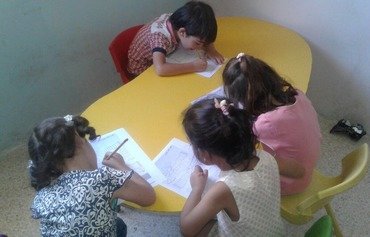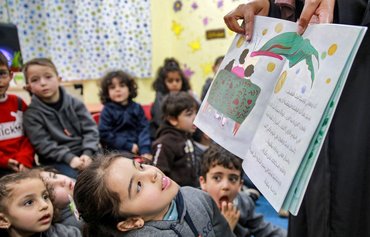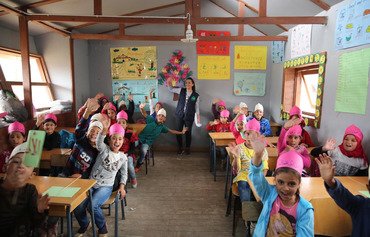Some Syrian children have known nothing but war.
They have spent their entire lives being frightened every time a missile or an artillery shell falls, and have gone to sleep and awoken to the sound of gunfire, said Rania Zaghir, a Lebanese children's author of Syrian descent.
Moved by the plight of these children, Zaghir visited western rural Hama in September, where she spent a week reading to children in a number of villages and schools, including al-Malak al-Saghir (Little Angel) kindergarten in Salhab.
She also encouraged the children to share their experiences with tragedies, trauma and wars.
![A little girl plays at al-Malak al-Saghir kindergarten in Salhab. [Photo courtesy of Maram Ammar]](/cnmi_am/images/2017/10/10/9853-Syrian-girl-plays-600_384.jpg)
A little girl plays at al-Malak al-Saghir kindergarten in Salhab. [Photo courtesy of Maram Ammar]
![Syrian children engage in fun and creative activities as part of UNICEF's Mosaic project. The project is designed to reintegrate the children into their environment, build their capacities and dispel their fear and hostility. [Photo courtesy of UNICEF's Salhab Centre]](/cnmi_am/images/2017/10/10/9854-unicef-salhab-center-600_384.jpg)
Syrian children engage in fun and creative activities as part of UNICEF's Mosaic project. The project is designed to reintegrate the children into their environment, build their capacities and dispel their fear and hostility. [Photo courtesy of UNICEF's Salhab Centre]
"I wanted to be among the children of Syria and their families after seven years of bloody war, especially children who are as old as the war," she told Al-Mashareq. "My goal was simple: to help the child to contemplate and create, and discover the aesthetic aspects of life, nature, family and the environment."
She brought her own books with her, in the hope of inspiring the children to express their abilities and talents and in order to awaken them emotionally.
"I wanted to tell them through my books that they have the love, affection and encouragement of others," Zaghir said.
The Syrian children she met are "aware of their vulnerability", she said, adding that they "feel a need to be protected and cared for, especially as they are children of war and did not enjoy an innocent childhood as they should have".
"Fear accompanies them, and they need security, safety, stability, books and cozy reading sessions," she added.
In her story-reading sessions, Zaghir said she was able to transport the children to another world, that made them forget the circumstances of the war.
"The sounds of warplanes were present during the reading," she said. "I could hear them clearly, but the children paid them no mind, maybe because they have become accustomed to hearing them, or maybe because they were enthralled by the stories and the activities we held."
'War has entered every child's heart'
Just as Syria's war has entered every house, it also has entered the heart of every Syrian, especially children, al-Malak al-Saghir French language teacher Maram Ammar told Al-Mashareq.
There have been clashes on the outskirts of Salhab, where the kindergarten is located, she said, and missiles and artillery shells have been falling in the area.
The children "live in constant fear and terror, which has had a severe psychological effect on their conduct and behaviour", she said.
"What has come to pass required us, as a teaching staff, to redouble our efforts to make them feel safe, especially the orphans among them who have lost a parent to the war," Ammar said.
"We work a lot on engaging them in activities that boost their self-confidence and their confidence in others," she said. "We hold weekly group breakfasts interspersed with joyful interludes to make them forget their sadness."
The teaching staff stage performances, dressed as the cartoon characters the children love, "to bring joy to their hearts and laughter to their faces", she said.
Meanwhile, special attention is given where needed, including psychological support on an individual basis.
Whenever security conditions permit, the school organises visits to kindergartens in other parts of Hama to help integrate the children into their environment and instill a sense of solidarity among them, Ammar said.
The work of the kindergarten’s teaching staff is carried out in co-operation with UNICEF and the Syrian Red Crescent, which run child-focused psychological and social support programmes.
These efforts "have borne fruit, evidenced by the fact that three weeks into the school year, we are sensing that the children’s disposition has improved compared to last year", she said.
'Mosaic' symbolises Syria's diversity
UNICEF has been implementing a project to reintegrate Syrian children into their communities in co-operation with civil society organisations.
The project is called "Mosaic", to symbolise ethnic and sectarian diversity.
UNICEF is implementing this project in western rural Hama in co-operation with the Masyaf Charitable Association and through five centres in Salhab, Masyaf, al-Bayadiya, al-Findara and Jub Ramlah.
The centres offer various programmes for children, the Mosaic project's Salhab centre director Bashar Suleiman told Al-Mashareq.
These include a fun programme for children ages 6 to 18 that includes painting, music and sports, and another that helps them develop life skills.
These aim to boost the children’s self-confidence and develop their communication skills, he said.
Another Mosaic programme features a creativity lab, which invites the children to put forth their ideas, some of which are then implemented by organisations operating under the UNICEF umbrella.
These ideas include beautifying Salhab by placing planters and trash receptacles in public streets and neighbourhoods, and staging theatrical shows and contests.
The centre receives new children every day, including some who were displaced some time ago, Suleiman said.
Since the centre opened 10 months ago, he added, 7,000 children have benefitted from the programme, "while the number of children who have benefitted from all five centres combined is more than 25,000".
"They were initially riddled with anxiety and fear, in an exhausted psychological state and very hostile, but they quickly responded to the psychological and social support programmes we provide for them," he said.

![Kindergarten students take part in an activity at al-Malak al-Saghir (Little Angel) kindergarten in Salhab, in Syria's western rural Hama province. [Photo courtesy of Maram Ammar]](/cnmi_am/images/2017/10/10/9852-Syrian-kindergarten-students-600_384.jpg)






